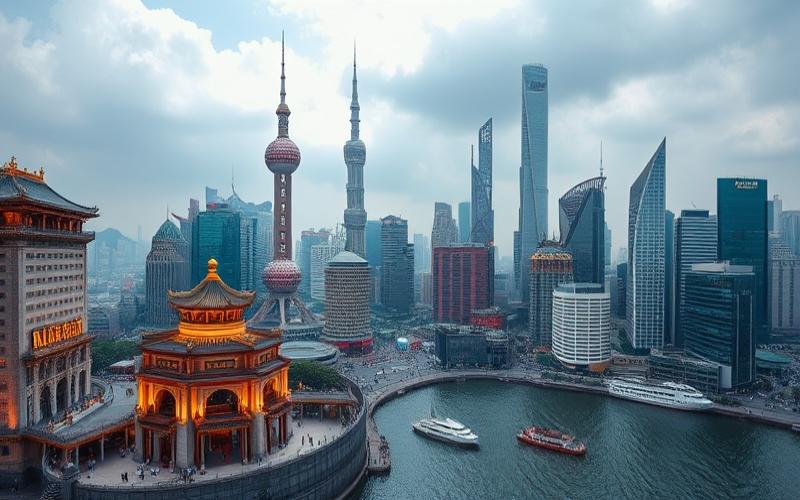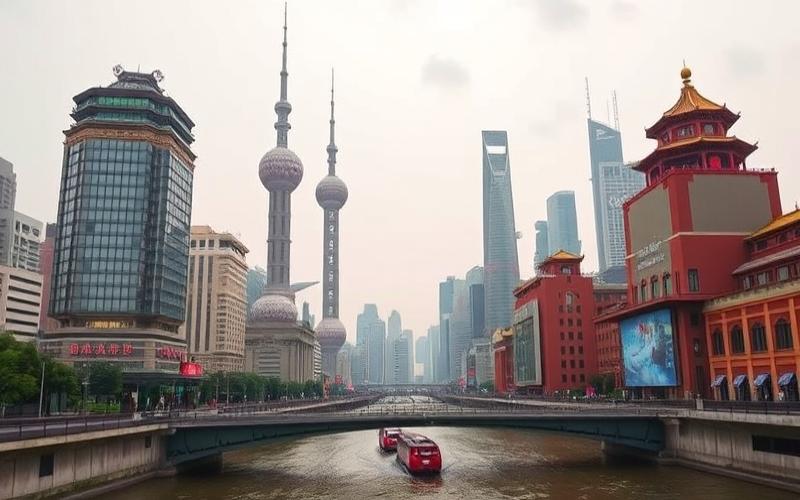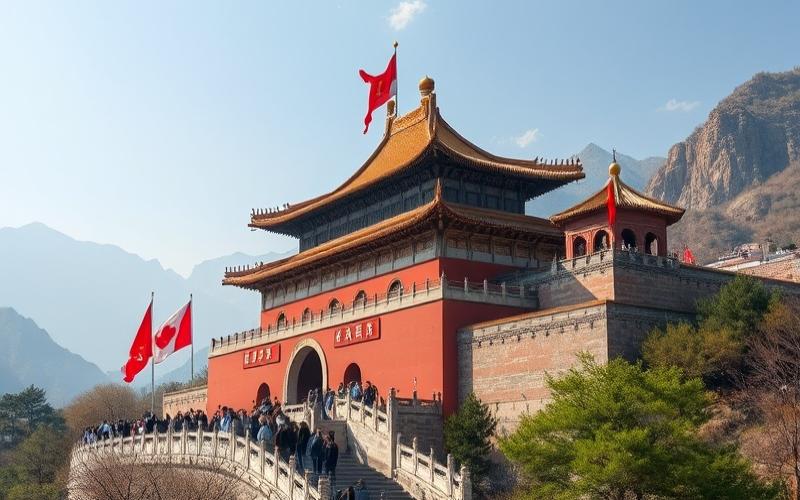
 Published on and written by Cyril Jarnias
Published on and written by Cyril Jarnias
Relocating to China
Relocating to China can be a rewarding experience, but it’s essential to prepare thoroughly to ensure a smooth and secure transition. With its bustling cities, rich culture, and diverse professional opportunities, China is attracting more and more expatriates.
However, adapting to a new environment involves considering various safety aspects, from health considerations to cybersecurity issues. This article will guide you through a series of practical tips to live your Chinese adventure with peace of mind, helping you avoid common pitfalls and maximize your well-being in this fascinating country.
Understanding Safety in China for Expatriates
China is known for its very low crime rate, making it one of the safest countries in the world for expatriates.
It’s not uncommon, even in large cities, to find your forgotten belongings intact the next day. This overall climate of safety is explained by the massive and visible presence of surveillance cameras in public and private spaces.
| Region | Safety Level | Main Characteristics |
|---|---|---|
| Urban (cities) | Very High | Omnipresent electronic surveillance, responsive police, low delinquency |
| Rural (countryside) | High | Tight-knit communities, less electronic surveillance but strong local vigilance |
Urban/Rural Differences:
- In metropolises like Beijing or Shanghai, electronic surveillance is maximum: every street, shopping center, or station is equipped.
- In rural areas, technological control diminishes but social and community pressure remains strong; there is a marked respect for local rules.
Local Laws and Their Impact on Expatriates’ Daily Life:
- Zero tolerance for any behavior deemed illegal (drugs including cannabis); immediate sanctions ranging up to incarceration or expulsion.
- Identity checks are frequent: it’s imperative to always carry your original passport.
- Campaigns regularly target bars or suspicious establishments; choose carefully where to go out.
- Strict respect for maintaining public order: unauthorized protests are prohibited.
- Learn to use WeChat, the main digital tool in China (secure mobile payments).
- Inform yourself about camera locations: everywhere in the city and often connected to authorities.
- To preserve your privacy: avoid sensitive discussions in public.
- Adopt a discreet attitude during any police checks.
- Dial 110 to reach English-speaking police if needed.
Essential Cultural Nuances for Personal Safety:
The notion of collective order takes precedence over individual rights. A misunderstanding can quickly turn into an incident if perceived as disrespect towards authority or others.
- Avoid any public criticism of the government or sensitive political discussions with locals and foreigners.
- Prefer formal politeness during official interactions.
Resources Available for Expatriates:
Practical List:
- French consular services accessible in Beijing, Shanghai… Legal assistance & urgent help available via embassy/consulate.
- Useful numbers:
- National Police: 110
- Ambulance: 120
- Fire Department: 119
- French Embassy/Consulate depending on region
Connected Groups:
Specialized social networks (WeChat, international Facebook groups) to exchange daily tips among expatriates;
Concrete examples regularly shared on these platforms regarding common scams or delicate situations experienced locally.
Essential Practical Tips:
- Always have a digital/scanned copy of your passport quickly accessible.
- Note the exact addresses of embassies/consulates according to your region.
- Join a local expatriate group upon arrival to immediately benefit from field experience feedback.
- Stay vigilant about local laws – regularly consult legal updates via the official French diplomatic website before any internal/external travel.
A fine understanding of the Chinese security context relies as much on strict respect for rules as on proactive adaptation to local cultural particularities
Good to Know:
China is often considered one of the safest countries in the world for expatriates, thanks to a low crime rate, particularly in large cities like Beijing and Shanghai, where police presence is reinforced. However, rural areas present differences in terms of safety, with less surveillance but also fewer easily accessible emergency services. Local laws, strict regarding nightlife and alcohol consumption, can sometimes surprise expatriates and require adaptation to avoid legal complications. Omnipresent security and surveillance systems, although often discreet, are a reality to get used to; it’s advisable to inquire within the expatriate community via WeChat groups to share and receive practical advice. Learning cultural nuances, such as the importance of respecting local customs, helps prevent misunderstandings that could affect personal safety. Finally, resources such as consular services and online forums dedicated to expatriates are essential to navigate potential challenges and live a serene experience in China.
Best Tips for a Safe Relocation
It is fundamental to thoroughly inform yourself about the laws and regulations in force in China to avoid any disputes or misunderstandings with local authorities. Rules can differ significantly from Western habits, particularly concerning immigration, daily life, and certain public behaviors.
Subscribing to an international health insurance covering care abroad is indispensable. In China, this insurance is mandatory to obtain a visa; it must include reimbursement of medical expenses (consultations, hospitalizations, medications) and coverage of medical repatriation if necessary. Care in private or international hospitals is very costly: a hospitalization can exceed €10,000, childbirth over €8,000. Without appropriate coverage, these fees are generally required in advance.
For Choosing Your Residence:
- Prefer neighborhoods known for their safety.
- Ensure proximity to medical facilities adapted to foreigners.
- Verify the quality of infrastructure (drinking water, secure internet access).
- Consult the local expatriate community for concrete recommendations.
Integrating into the Expatriate Community Allows:
- To quickly obtain support and practical advice.
- To share information about local daily life and cultural adaptation.
- To have a useful network in case of emergency or to facilitate settlement.
Secure Communication Methods
Secure communication methods are essential to stay in contact with loved ones:
- Use applications known for their reliability (WeChat with two-factor authentication).
- Prefer recognized VPNs allowing secure access to locally blocked social networks.
- Keep several options available (encrypted email, international instant messaging).
Respecting Local Customs
Respecting local customs avoids many cultural misunderstandings:
- Adapt your clothing according to the context.
- Discreetly observe local behavior before acting.
- Avoid sensitive topics like national politics or religion during public discussions.
Preparation for Potential Emergencies
| Measure to Take | Description |
|---|---|
| Emergency Kit | Common medications, photocopies of passport/visa/insurance |
| Contact List | Local numbers for police/health/emergency + loved ones |
| Dedicated Mobile App | Geolocation of embassy/consulate |
It is crucial to know the contact details of embassies or consulates, which can provide consular assistance (loss of official documents, legal aid) and logistical support during critical situations. Keeping this information accessible at all times greatly facilitates any urgent procedures:
- Physical address of embassy/consulate
- Consular emergency phone number
- Official email
Thoroughly inform yourself about your local rights,
Subscribe to comprehensive health insurance,
Choose safe housing,
Build your network among expatriates,
Use secure communications,
Respect Chinese customs,
Know consular contacts – so many major assets to live serenely in China!
Good to Know:
Before settling in China, it’s crucial to thoroughly inform yourself about local laws and regulations to avoid legal complications; also invest in international health insurance, as medical expenses can be high. Choose a residence in a neighborhood known for its safety, preferably with expatriates who will provide you with support and valuable advice. Integrate into expatriate circles to build a useful network, and use secure communication methods to stay in contact with your loved ones. Respect local customs to prevent any cultural misunderstanding, and prepare for potential emergencies by knowing the contact details of embassies and consulates to obtain rapid help if needed.
Tip to Enhance Daily Peace of Mind
Tip to enhance daily peace of mind as an expatriate in China:
- Using Translation Applications
Mobile applications such as Pleco, HelloChinese, or even Google Translate (with VPN) greatly facilitate daily communication, especially outside professional environments where English is rarely spoken.
WeChat is also indispensable for exchanging, paying, or navigating. - Familiarizing Yourself with the Local Neighborhood
Identifying essential shops (grocery stores, pharmacies, hospitals, police stations) and safe routes on foot or by public transport is essential to gain autonomy and serenity.
Certain neighborhoods, like Sanlitun in Beijing or the French Concession in Shanghai, are known for their welcoming environment for expatriates. - Learning the Basics of the Local Language
Mastering a few phrases in Mandarin (greetings, directions, thanks) allows for easier adaptation and handling of common situations.
Taking courses online or at a local school accelerates integration.
| Useful Application | Main Function |
|---|---|
| Messaging, payment, professional contacts | |
| Pleco | Dictionary and translation |
| HelloChinese | Mandarin learning |
| VPN (Express, Nord, etc.) | Access to Western websites |
- Maintaining Contact with a Local Network or Expatriate Community
Joining groups on WeChat, Facebook, or via local associations allows obtaining practical advice, sharing experiences, and benefiting from support in case of difficulties. - Stress Management Techniques
Practicing meditation, mindful breathing, or allowing yourself regular relaxation moments helps overcome cultural and professional challenges.
Using meditation applications or joining local groups (yoga, tai-chi) promotes well-being.
Additional Tips for Peace of Mind:
- Always carry your passport or a copy to respond to frequent checks.
- Install a VPN before arrival to continue accessing your usual resources.
- Inform yourself about local customs (politeness, respect for hierarchy, discretion in exchanges).
Adopting these practical strategies contributes to harmonious integration and lasting peace of mind during relocation to China.
Good to Know:
To enhance your daily peace of mind as an expatriate in China, it’s wise to download translation applications on your smartphone to overcome language barriers, especially in emergency situations. Familiarize yourself with your neighborhood to identify safe routes and essential services, such as hospitals and police stations. Learning a few basics of the local language will only improve your experience, particularly for interacting with your neighbors, which will strengthen your integration and safety. Joining expatriate communities can offer valuable support, fostering a sense of belonging and facilitating the exchange of practical advice. In parallel, integrating stress management techniques, such as meditation or yoga, can greatly help you adapt to cultural changes or professional pressures.
Disclaimer: The information provided on this website is for informational purposes only and does not constitute financial, legal, or professional advice. We encourage you to consult qualified experts before making any investment, real estate, or expatriation decisions. Although we strive to maintain up-to-date and accurate information, we do not guarantee the completeness, accuracy, or timeliness of the proposed content. As investment and expatriation involve risks, we disclaim any liability for potential losses or damages arising from the use of this site. Your use of this site confirms your acceptance of these terms and your understanding of the associated risks.

























































